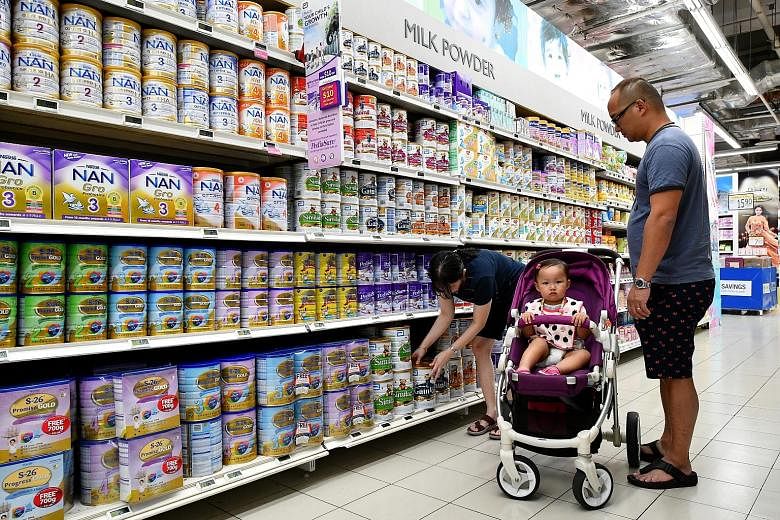The price of infant milk powder continues to climb, but parents say they have little choice but to fork out for the formula.
After more than doubling between 2004 and 2014, the average price of a 900g tin has risen a further 10 per cent in the past two years, according to figures from the Singapore Department of Statistics.
Over the past decade, the average price of such a tin has gone from $25.42 to $56.06, a rise of about 120 per cent.
This outstrips the price increases of other dairy products and household staples over the same 10-year period.
The cost of fresh milk, for instance, went up 6.8 per cent to $2.81, while the price of eggs climbed 28 per cent to $2.17.
A baby can go through three to four 900g tins a month, which means families can easily spend around $150 a month on just milk for a child.
Mr Melvin Wu, 34, who runs local parenting portal Babyment, told The Straits Times that he was shocked to discover this month that he was paying about 25 per cent more for Similac's Stage 3 milk powder for his two young children, compared with four years ago when he bought it for his oldest child, now five.
He went on to check prices of other popular brands Friso, Nan H.A., S26, Mamil and Enfamil and found similar price rises, he said.
Milk powder companies Abbott, Nestle, Mead Johnson and FrieslandCampina, when asked about the price jumps, said it was down to research and development to improve formulas, and rising overhead costs. Dumex did not respond to queries.
-
Breast still best, says paediatrician
-
The Health Promotion Board (HPB) supports exclusive breastfeeding from birth to about six months and continued breastfeeding until one year and beyond, because of its benefits for the baby.
But there are situations when infant formula is medically recommended, said Dr Yvonne Ng Peng Mei, senior consultant in the Department of Neonatology at National University Hospital.
A mother who is not able to produce enough breast milk, has HIV, is undergoing chemotherapy or radiotherapy, or is too ill to care for her baby should use infant formula.
Breastfeeding in the first two weeks after birth can also be challenging, which may be discouraging, Dr Ng said. Common issues include ineffective latching on, which makes it difficult to determine if the baby is getting enough milk, and nipple soreness.
But mothers should not give up breastfeeding as these problems can be managed, she said.
Nurses in maternity units offer guidance on breastfeeding and women can turn to other mothers and peer counsellors from community groups like Breastfeeding Mothers' Support Group and Joyful Parenting. The HPB also provides a Healthy Start For Your Baby guide to every parent.
If uncertain about whether a breastfed baby is getting enough milk, parents should seek the assistance of healthcare professionals, said Dr Ng.
To help offset rising prices, all five community development councils and the NTUC FairPrice Foundation banded together last month to fund a $1.5 million milk scheme, giving 7,500 low-income families vouchers to buy milk powder.
Supermarket chains FairPrice, Giant and Sheng Siong said that they stock a range of milk formula, including cheaper options.
While the Health Promotion Board encourages breastfeeding exclusively for at least six months, for some mothers, this is not an option. As her five-month-old son Louis was losing weight on breast milk, doctor Gail Cross began to supplement his diet with formula.
A $70-a-tin brand recommended by her paediatrician did not go down well with Louis, said Dr Cross, 36. The family settled on a Bellamy's Organic brand.
Going through three to four tins a month ran to more than $200. To save costs, she asked relatives visiting from Australia, where the powder is cheaper, to buy some over.
Administrative officer Tanya Ong, 36, said that she plans to start buying milk powder from Malaysia for her infant son, as products there are cheaper.
CIMB Private Banking economist Song Seng Wun said that while there are many factors that go into pricing, milk formula is seen as a necessity.
He added: "But because it is a product that you buy only for a limited period of time, parents just bear with it."




